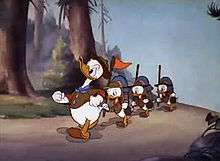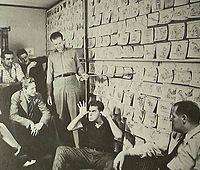Good Scouts
| Good Scouts | |
|---|---|
| Donald Duck series | |
 Donald and his nephews arrive at their camp site | |
| Directed by | Jack King |
| Produced by | Walt Disney |
| Story by |
Carl Barks Harry Reeves |
| Voices by | Clarence Nash |
| Animation by |
Paul Allen Al Eugster Frank Follmer Jack Hannah Ed Love |
| Studio | Walt Disney Productions |
| Distributed by | RKO Radio Pictures |
| Release date(s) |
(USA) |
| Color process | Technicolor |
| Running time | 8 minutes |
| Country | United States |
| Language | English |
| Preceded by | Donald's Nephews |
| Followed by | Donald's Golf Game |

Good Scouts is a 1938 American animated short film produced by Walt Disney Productions and released by RKO Radio Pictures. The cartoon follows Donald Duck leading his nephews Huey, Dewey, and Louie on a scouting trip through the wilderness. It was directed by Jack King and features Clarence Nash as Donald and the three nephews.[1]
Good Scouts was nominated for an Academy Award for Best Animated Short Film at the 11th Academy Awards in 1939, but lost to Disney's own Ferdinand the Bull. Also nominated that year from Disney were Brave Little Tailor and Mother Goose Goes Hollywood, setting the record for most nominations in the category for one studio. Good Scouts was the first Academy Award nomination for the Donald Duck series.
Plot
Donald Duck and his nephews Huey, Dewey, and Louie are on a scouting expedition at Yellowstone National Park with Donald acting as the Scoutmaster. The ducks march along in military style singing "Polly Wolly Doodle." Arriving at their camp site, Donald unsuccessfully tries to teach the boys wilderness skills. He tries to chop down a petrified tree and pitch a tent with bad knots causing the nephews to laugh.
Frustrated at the nephews' lack of gratitude for his efforts, Donald decides to make them sorry by pretending to have been injured, pouring ketchup over himself. The dutiful nephews spring into action and quickly bandage Donald from head to toe. Donald is then unable to see and wanders aimlessly, eventually falling into a honey jar.
A large grizzly bear soon arrives having been attracted by the smell of food. Trying to escape the bear, Donald runs off a cliff and falls onto "Old Reliable Geyser" (a reference to Old Faithful) and gets his rear end stuck in the opening of the geyser. The water shoots Donald into the air, bringing him closer to the bear who is still above at the cliff's edge.
The nephews try to save Donald by plugging the geyser. They finally roll a large boulder over it, but the geyser is only stopped momentarily. Donald is seen later that night, still running from the bear on top of the boulder rotating under their feet, perfectly balanced on top of the continuous stream of water from the geyser. The nephews, having exhausted their means of rescuing their uncle, bed down for the night in their tent, wishing him "Good night", "Unca", "Donald".
Character development
Good Scouts was the second animated appearance of Huey, Dewey, and Louie, who had first appeared in the Donald Duck comics, and marked a significant change in their behavior. In their earlier appearances, the triplets were mischievous and caused a lot of trouble for Donald. But in Good Scouts the boys seem to have matured a great deal. They are shown as being resourceful, using teamwork, and generally trying to help Donald out of trouble. Although the boys are seen as mischievous in several later appearance, it was this more helpful characterization which would become more characteristic of them.
The film was also the first to show Donald in a leadership role. In earlier appearances he was "someone just trying to go about his business and getting interrupted and irritated by others."[2] As such, the film was an influence to later films such as Sea Scouts (1939) and Home Defense (1943).
Releases
- 1938 – theatrical release
- 1956 – Disneyland, #2.18: "A Day in the Life of Donald Duck" (TV)
- 1961 – Walt Disney's Wonderful World of Color, #8.11: "Kids is Kids" (TV)
- 1965 – Donald Duck Goes West (theatrical)
- 1981 – "Kids is Kids Starring Donald Duck" (VHS)
- c. 1983 – Good Morning, Mickey!, episode #69 (TV)
- c. 1992 – Donald's Quack Attack, episode #61 (TV)
- 1997 – The Ink and Paint Club, episode #1.20: "Huey, Dewey and Louie" (TV)
- 2004 – "Walt Disney Treasures: The Chronological Donald" (DVD)
- 2005 – "Classic Cartoon Favorites: Extreme Adventure Fun" (DVD)
- 2011 – iTunes (digital download)
See also
References
- ↑ Good Scouts at the Internet Movie Database
- ↑ Good Scouts at The Disney Film Project
External links
- Good Scouts at The Big Cartoon DataBase
- Good Scouts at the Internet Movie Database
- Good Scouts at The Encyclopedia of Animated Disney Shorts